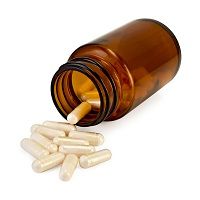Article
Dietary Supplements Increase Risk of Severe Medical Event
Author(s):
A recent study found that dietary supplements for weight loss, energy, and muscle building were associated with a 3 times greater risk of severe medical events than vitamins.

A recent study has found that dietary supplements were associated with a nearly 3 times greater risk of severe medical events in children and young adults when compared to vitamins.
Investigators examined more than 40,000 adverse event reports and found that supplements for weight loss, muscle building, and energy were associated with risk of severe medical events 3 times greater than vitamins. Additionally, those sold for sexual function and colon cleanse were associated with 2 times the risk compared to vitamins.
"The FDA has issued countless warnings about supplements sold for weight loss, muscle building or sport performance, sexual function, and energy, and we know these products are widely marketed to and used by young people. So, what are the consequences for their health? That's the question we wanted to answer," said lead author Flora Or, a researcher with Harvard Chan School's Strategic Training Initiative for the Prevention of Eating Disorders.
Investigators carried out the retrospective case series study through use of data from the US Food and Drug Administration Adverse Event Reporting System (FAERS) to identify a relationship between supplement categories and adverse events in children, adolescents, and young adults. Investigators identified a total of 40,086 adverse event reports in the database and used a cohort of 1392 nonduplicative adverse event reports that involved dietary supplements among individuals between 0 and 25 years old. Of that cohort, investigators excluded 334 multiple-supplement-related reports, 22 reports missing gender data, and 59 missing data on primary category of dietary supplements. The final study included 977 adverse event reports.
Investigators included up to 7 clinical events, which they categorized as severe and nonsevere, in each adverse event report. Severe outcomes were defined as death, disability, hospitalization, ER visit, life-threatening events, and/or required intervention to prevent permanent disability. Examples of nonsevere outcomes are abdominal pain, chills, and back pain.
For their statistical analyses, investigators performed chi-square tests on proportions of gender, severe medical outcome on aggregate, and by outcome type across age groups (0 to 11 years, 12 to 17 years, and 18 to 25 years). Investigators examined the distribution of supplement categories by gender and age groups and also by types of severe medical outcomes. Multivariable Poisson regression with robust standard error variance to determine the risk ion severe
After analyses, results of the chi-square tests suggested there was no statistical differences in proportions of gender across the 3 age groups, but different proportions of hospitalizations (x2=15.6, P < .01), and severe medical outcomes (x2=28.5, P < .01) across age groups. The 977 adverse events included 166 hospitalizations, 39 reports involving life-threatening events, and 22 reports that involved death.
Based upon the results of Poisson regression models, use of a single supplement were associated with almost 3 times the risk of severe medical events compared to vitamins. The risk ratio of supplements for muscle building was 2.7 (95% CI = 1.9-4.0), 2.6 (95% CI = 1.9-3.6) for energy supplements, and 2.6 (95% CI = 1.9-3.4) for weight loss supplements. Supplements sold with sexual function claims had a risk ratio of 2.4 (95% CI = 1.3-4.3) and colon cleanse supplements had a risk ratio of 1.7 (95% CI = 1.0-2.8).
Authors noted several limitations within their study. The series design and under-reporting may have led to selection bias because only reported cases were available for analysis. Categorization of supplements consumed are often not mutually exclusive. Several hundred adverse event reports involved consumption of multiple supplements. Lastly, the FAERS database includes only adverse event reports attributed to supplement use but does not provide information on the number of people exposed to the supplements who had no adverse events.
This study, titled “Taking Stock of Dietary Supplements’ Harmful Effects on Children, Adolescents, and Young Adults,” is published in the Journal of Adolescent Health.





